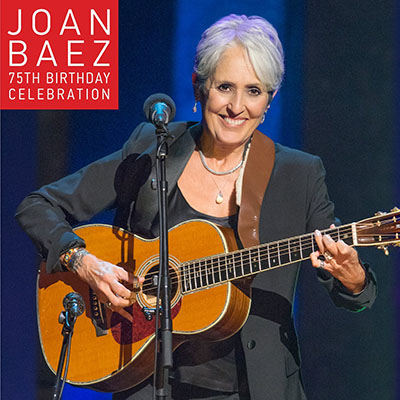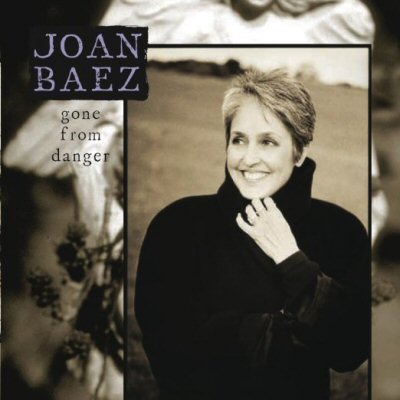JOAN BAEZ: STILL SINGING HER SONG OF PEACE
By Paul Freeman [1984 Interview] A 2017 inductee into the Rock and Roll Hall of Fame, Joan Baez remains an icon of folk music, as well as the peace movement. We spoke to her about her activism in 1984: The resonant voices that spoke so eloquently of peace, love and brotherhood in the 60s - where have they gone? Some have put their energies into commercial projects. Some have become curiosities on the lecture circuit or participants in oldies tours. Some have been silenced by apathy - their own or that of the public. Some have been silenced by death. Joan Baez is still singing out, her crystalline voice carrying not only exquisite musical expressions, but impassioned social and political pleas, as well. Her ideology isn’t influenced by trends. Bolstered by her faith, hope and humor, she follows the clearly defined path she discovered in her youth. “My activism started when I was 14,” she says. “It started in the 50s with my Quaker family and ban-the-bomb marches. “There was a kind of pacifism to which my parents adhered, that I apparently took very seriously. That concern stayed with me. You could probably spend months and months on the Freudian aspects of why I do what I do.” Her father’s work with UNESCO necessitated a move to the Middle East in the 50s. “We saw desperate things and sad things,” she says. “We saw poverty. We saw things I wouldn’t have learned about, if I’d stayed in the States. That had an effect on me.” In 1959, Baez electrified the Newport Folk Festival audience with an angelic timbre and an acoustic guitar. Her career flowered, and with it, the opportunities to spread the Ghandian doctrine of nonviolence. She marched with Martin Luther King, Jr. She sang with Dylan. She led the forces of the anti-war movement. She set off a tornado of controversy with a visit to Hanoi. Some spoke of her with reverence; other with outrage. “I liked to be liked, as does everybody else in the world,” Baez says. “But the things I do, particularly speaking out against the nation/state, people just hate that. And I think it’s something we have to confront in every country in the world. “Our addiction to our countries - whether we be Chilean, Chinese, Russian or American - is our greatest difficulty. It’s the biggest disease and the biggest religion. But in saying that, you know instantly you’re going to aggravate about 90 percent of the people in the world. “You have to understand that the minute you open your mouth in public, most people are not going to understand what you’re doing. You will be used by some and abused by many.” Baez, who’s made more than three dozen albums, has been without a U.S. recording contract for the last few years. But in Europe, she’s a superstar. Her “Live in Europe ’83” LP went gold in France, and the “Children of the ‘80s” single was a smash. “Here I would get 3,000 people aged 30 to 50, with some kids sprinkled in. In Europe, in the same situation, I’d get 10,000 people and it’d be 80 percent kids. “In Europe, the fragility of the world is felt. Young Europeans are more aware of it. They’re much more active than young people here. I speak to their condition. “Here, young people are spending a lot of time trying to avoid the issue, because it’s too scary and because they have nothing that really focuses them to look it straight in the eye. “The trick will be finding something that’s as alluring as Atari games and MTV. At this point, I can understand kids who want to get themselves hypnotized by MTV.” In 1979, Baez took a major step in keeping the spirit alive by founding Humanitas International. The organization, based in Menlo Park, California, is dedicated to preserving human rights, achieving disarmament and establishing new programs in nonviolence education. “Humanitas,” Baez says, “teaches us to see with both eyes. We have to wean people away from their philosophies. If you’re left wing or right wing, you’re seeing with only one eye. “We have to see repression and oppression for what they are, no matter where they are. We have to see the Quaker message - that we are one family. We really can’t go forward, building up spiritual and moral fiber, when we conduct our international relations the way we do, spending a million dollars a minute on armaments, holding the whole world hostage. “It may sound like some hare-brained, Utopian thing, but I really think that to have a decent world, we have to disarm. If we don’t, we either live in limbo or we die in World War III.” Baez staves off discouragement. “When you’re looking for results and not getting any, it helps to know you’re doing as much as you possibly can and that you feel you’re on the right track. “T.S. Eliot had a beautiful saying: ‘For us, there’s only the trying and the rest is not our business.’”
And you may also enjoy our 1998 interview with Ms. Baez:
JOAN BAEZ:
By Paul Freeman [1998 Interview] We interviewed Ms. Baez following the release of the 1997 “Gone From Danger” album. It’s now available in a two-CD set from Razor & Tie, which includes a bonus disc of 1997 Mountain Stage performances. Her latest release, as of this writing, is 2015’s “Joan Baez: How Sweet The Sound,” on CD and DVD. She continues to perform, moving audiences with the power, purity and beauty of her voice. In the '60s the crystalline voice of Joan Baez helped introduce songwriters Bob Dylan, Leonard Cohen, Phil Ochs and Tim Hardin. In 1997, her new album, "Gone From Danger," focuses on a new generation of talented writers. The world once again seems eager to listen to songs that emphasize acoustic sounds, simple production and compelling lyrics. "They say everything goes in cycles," Baez said. "But that could be 20 years or 50 years. So I'm just lucky. "Tracy Chapman started writing songs for which they had to create a new radio format. That gave the room for a lot of people who had been writing and hadn't really been heard," she said. "If Triple A stations are an oasis from the pounding and slashing and banging kind of music, then I'm happy to be there. How much noisier and faster can the world get?" "Gone From Danger," with a quiet power, presents 10 outstanding contemporary folk songs. Baez' manager, Mark Spector, had sifted through hundreds of tunes to select the finalists. "He would listen to a song over and over to determine if it was good enough. I don't have the patience to do that," Baez said. "For some songs he would say, 'You have to listen to this two or three times.' It would turn out that they were perfect. But I wouldn't have gotten that the first time.” Spector's work is critical. "There's a lot of music out there that doesn't move me," Baez said. "There's a lot of music I like, but wouldn't be appropriate for me to sing. "It has to ring the right bell inside me. The melody is important, and, for my age, it's also challenging to be able to continue in the upper range," said Baez, who has long been considered the premier female performer of the '60s folk revival. The lyrics must convey a message -- emotional, if not political or social. Among the topics touched upon in the album are illegal immigrants, the homeless and incest. "The second time around," Baez said, "I can't reinvent myself in any dishonest way. So I'm fortunate that there are people writing these kinds of songs. They write songs that are close to the heart and probably considered counterculture, which is where I've always been comfortable.” Many may complain that today's songs can't compare with those penned in the '60s, but Baez disagrees. "People always want to go back to what they know. There are songs on this album that are, in every way, as good as any song anybody could write. "If people want a 'Blowin' in the Wind' and an 'Imagine,' they have to realize that those songs cannot come out of a socially static or vacuous atmosphere. We continue in the era of greed. In cultural, spiritual and educational terms, we're in a massive decline. These young voices, to me, are simply trying to find their place, trying to keep some kind of heart.” Upon meeting these young writers, Baez found that she had much in common with them. One, Dar Williams, was already a Baez protege. Sinead Lohan and Mark Addison reflected many of Baez' beliefs. So did Betty Elders and Richard Shindell, who will be touring with Baez. "They seem to share most of my social-political thoughts and feelings to a degree. They all care," she said. "They're all concerned about the environment, ecology, the Earth, the redwoods, the American Indians. The chances are, if we were sitting in a bus after a show and I said something about the Gulf War, that everybody would go, 'Boo. Hiss. What a phony farce that was!’ "Somehow or other, in the process of choosing the songs, we've also found a root to the people.” Baez does admit that, on occasion, someone whose songs she admires turns out to have conflicting viewpoints. "I remember a little discussion I had once with Bruce Springsteen. We were on the Amnesty International tour together. Of course, I had to pick the one thing we would probably disagree on." She laughs. "It was the death penalty. He was very undecided about it. That didn't make him a bad person to me. It just meant there was more talk I had to bore him with before we were through with the tour.” Though often surrounded by talented songwriters, Baez rarely feels inspired to create her own material. She co-wrote just one song for "Gone From Danger.” "Wanting to do it is one thing. Being able to come up with something that I consider worthwhile is another," she said. "Every so often a really good song has appeared and I've carried it through. But I don't want to add to the mediocrity in this world. "I consider writing to be down around fourth or fifth on my list of gifts. I'd rather draw, do poetry or paint. So, fortunately, I have a lot of new friends who can do the writing for me." For news on this artist, visit www.joanbaez.com. |

